#fair warning S1 ends on a cliffhanger
Explore tagged Tumblr posts
Note
hii i don't know anything about the show you just reblogged but the two girls at the front have malvie hair colors and that has colored me interested! what's the show about?
Hi Anon! 💕 If you're a Descendants enjoyer, I think Supernatural Academy would be right up your alley. The two girls are twin wolf shifter sisters and technically the main characters, but their friend group (found family) plays a big role, as well. All of their friends are incredibly loveable, but I have a soft spot for their canon aspec nonbinary faerie friend, Jae. 🥰
I don't want to spoil anything, so I will just say the plot begins with the twins meeting for the first time. One has been raised in the human world, not knowing who she really is, and the other has been raised in the hidden supernatural world. They soon discover the secrets of their past and the role they're destined to play in an ancient prophecy.
It looks like a kids show at a glance, but it's actually TV-14 so they're allowed to swear and show some blood, which is always fun lol. The queer rep is really good and handled well, and even though the twins have the expected male love interests, those relationships are actually pretty sweet.
So, if you're looking for something cute and fantastical with some good old cliches that feel fresher for the queer rep and that you can binge watch in a day (16 episodes, 30 minutes each), I highly recommend Supernatural Academy.
It grows on you quickly, trust me. I started it thinking it would just be some silly time killer, but the characters reeled me right in. If you decide to watch it, I hope you enjoy it as much as I did! ��
#anonymous#<3#supernatural academy#fair warning S1 ends on a cliffhanger#the main S1 plot does wrap up but there's a lot still on the table#so fingers crossed for S2 renewal#you can watch on Netflix or Peacock#I need to watch it again#I miss it already djdmdm
4 notes
·
View notes
Text
Spying, monitoring and not talking about it
At the end of s1 Crowley tells Aziraphale that heaven and hell will leave then alone for a while, until The Really Big One, all of Heaven and Hell against Humanity. So what happens next? Are these two actually doing anything to prepare themselves for it? Lay down some insurance? At least clock it when it all kicks off?
Well, Crowley is playing spy with hell pretty much from the start of the time Shax replaced him: in s2e1 he is sitting in the usual "spy rendezvous " spot, we even see a spy mistake him for someone else. This is a meeting where they are both keen to get information out out of the other, and Crowley even asks if she is spying officially or for her own benefit.

So what this means is that he was expecting something to happen, all these 4 years, and certainly since replacement by Shax he's been looking out for it. What is more, he at least told Aziraphale about Shax replacing him and potentially that he has these little meetups with her to keep tabs on hell and help her navigate the human world a little. Why do I come to this conclusion? Because right in S2E1 he says "guess who Shax was asking me about", and Aziraphale knows who Shax is and is not surprised she was asking Crowley about something.
But what about Aziraphale, I hear you ask. What is the angel doing, apart from baking cake in lockdown and being a pillar of the community, with a spot of brainwashing his dear neighbours on the side?
It seems to me, he is actually looking out for the potential warning signs in his own way. When Crowley comes back with the apology dance, he pretends to be going through the paper cuttings / news clippings (?) - why is he doing that? Why does he have these clippings on his desk? What is he expecting to find there if not the signs of The Really Big One? Probably, as long as it is just Tadfield showing amazingly perfect weather, there is nothing to worry about, but something along the lines of, say, a sudden frog rain might be indicative of something serious coming in.
Now, do I think these two are actually coordinating their efforts, discussing plans and keeping each other fully up to date? No, of course not! In the classic fashion of "I'll look out for danger and protect us, but will try ny best to not scare you needlessly" and "I am making my own plans, but I am not gonna tell you anything about them, at least for now", these two are not communicating. Again.
To be fair, Crowley does tell about Shax's questions, but only prefacing it with "I wasn't gonna say anything, but". But then they both are keeping things quiet and are not brining the other one fully up to date (BoL threats, Shax's hitchhiker adventure, Gabriel's prophetic words not mentioned), and it all leads to a mess of the Final Fifteen's cliffhanger.
It adds up so nicely, and sets us up beautifully for a big breakthrough for these two idiots (affectionate) in s3. I seriously can't wait.
43 notes
·
View notes
Text
delicate - chapter 19
In which Katara and the prince reflect on their actions, as well as the nature of their relationship.

AKA, the one that was partially inspired by a scene from Stranger Things S1 with Nancy and Jonathan from the episode “The Monster.”
Yes, Zuko is a well-intentioned idiot with the worst execution. He’ll get better, eventually.
Also, fair warning about the cliffhanger at the end, loves, and unfortunately I don’t have an ETA for the next update yet. Let’s just say things are about to pick up steam, not just for our main couple…
#zutara#zuko x katara#zutara fanfiction#my fanfiction#my fanfic#my stuff#in which the author was shamelessly inspired by pride & prejudice + bridgerton
13 notes
·
View notes
Note
Hiya, Steph! :D I was wondering if there was any Gen/Mild-Johnlock fics for if the explosion in TGG had more of an impact on Sherlock? Love your amazing blog, and thanks! :D
Hi Lovely!!
Aww, thanks!! I’m so happy you enjoy my blog! I have quite a few TGG-related fics, so how about I give them all to y’all?? :D Just check out my tags to see if it is an AU or not :) I’ve been meaning to do that
ANYWAY, if anyone has any to add (others or your own!), please let us know so we can get your fic out there!
THE GREAT GAME-RELATED FICS
The Moment When by drekadair (K, 509 w. || TGG Fic, Friendship, First Person POV Sherlock, Introspection, Worried Sherlock) – Sherlock sees John in the pool, and doubts. Set during the end of "The Great Game."
Five Seconds by xXLadyLovelaceXx (K+, 658 w. || Friendship, Introspection, TGG Pool Scene) – In the half-second before Sherlock shoots the jacket, John notices something.
Burn Burn by Jenn1984 (K+, 925 w. || Post-TGG, Angst, Worried / Panicked / Possessive Sherlock) – A week after the events of "The Great Game", Sherlock returns to 221B Baker Street to find it empty.
Idiot by Anesthesiologist (T, 1,229 w. || Hurt/Comfort, Friendship, TGG AU, BAMF John, Sherlock Whump, Inner Monologue, John Saves Sherlock, POV Sherlock) – What the heck happened? He remembered the pool and Moriarty, but then what? Had he been dying?
I Was Wrong by AllesandraQuartermaine (K, 1,496 w. || TGG AU, Friendship, Hospitalization / Injury, John’s Self Esteem, Sleepy Sherlock) – Sherlock and John have a conversation a few days after the pool face off with Moriarty. And John hears something quite surprising.
Back in the Saddle by grannysknitting (M, 1,577 w. || Post TGG AU, Donovan POV, Observation / Introspection, Protective Sherlock, Injured John, Case-ish Fic) – Their first return to solving crime after the pool and the explosion.
One in Ten Thousand by Blind Author (K+, 1,856 w. || Post-TGG, Friendship / Pre-Slash, Discussions of Violence, Worried then Curious Sherlock, Scars/John’s Bullet Wound, Medical Anomolies) – John seems to have unusual mobility for a shoulder wound…
Coming Full Circle by KCS (K+, 2,358 w. || Alternate TGG, Friendship, Drama, Violence/Death References, Drugging/Poisoning, Kidnapping, BAMF John, Moriarty POV, Introspection) – Moriarty had John for almost six hours between his abduction and the showdown at the pool - more than enough time to implement a Plan B for his escape should Sherlock call his bluff with the fake bomb vest.
It's All Fine by AkoyaMizuno (T, 2,459 w. || Post-TGG, Introspection, Mild Angst, Friendship) – Sherlock never asked what happened in the hours between John being kidnapped and the events at the pool. It occurs to him, days after the fact, that he probably should have.
Crime Scene Procedure for Death by Drowning by paxlux (T, 2,668 w. || Post-TGG, First Kiss, Sherlock’s Violin, Fluff) – He lies back in bed and listens to the notes and pictures them gathering around Sherlock’s feet like water. Part 1 of proper procedure
All That I Have by the_arc5 (M, 3,721 w. || Post-TGG Canon Divergence, Pining Sherlock, John Whump, Anxious / Worried Sherlock, Light Angst) – In the aftermath of the Great Game, Sherlock finds himself with a new weakness. John is both the cause and the cure.
Sink Like a Stone by pennydreadful (T, 4,348 w. || Angst / Dark, Cuddling/Snuggling) – After defeating Moriarty at the pool, life isn't quite the same around 221B Baker Street...it's more peaceful. And stranger.
The Care and Keeping of Your Mad Genius by Janieshi (T, 4,553 w. || Post-TGG, Friendship, Anxious/Worried Sherlock, Light Humour/Teasing, Alternating POV, Cranky Sherlock) – If he hadn't been so focused on holding the bastard still, John would have laughed aloud. This maniac really thought John was the pet in this dynamic?
The Refining Fire by Arwen Jade Kenobi (T, 5,451 w. || Post-TGG AU, Angst, Friendship, Alternating POV (Lestrade, Mycroft, Sherlock), Worried Sherlock, Hospital Recovery) – Fire can burn things to ashes, but it can also burn things together.
BANG by ElvendorkInfinity (T, 7,016 w. || Post-TGG AU, Angst, Hurt/Comfort, Worried / Scared Sherlock, Alternating POV, Whump, Hospital Recovery, Open Ending) – 'I should warn you,' Sherlock says, his voice steady and his eyes fixed on Moriarty. 'You are sadly misinformed.' And he fires. Prequel to M Is For Moriarty
The Hours Before Midnight by Lady Sam Mallory (T, 7,773 w. || TGG Fic, Angst, Hurt/Comfort, Torture / John Whump, Kidnapping, Drugging, Alternating POV, Worried / Protective Sherlock) – Moriarty doesn't play fair. John must deal with hours of torment from Moriarty before going to meet Sherlock at the Pool at the end of the Great Game and Sherlock must deal with the consequences of his boredom.
Victim, Bait, Hero, Friend by KimberlyTheOwl (T, 7,887 w. || Post-TGG Epilogue, Angst, Friendship, Hurt/Comfort, Introspection, Past Kidnapping / Torture / Implied Rape, Panic Attacks, Worried / Possessive Sherlock, Lestrade is a Good Friend) – Some insights into why John was perfectly willing to throw everything away for a chance to kill Moriarty at the pool. Trauma, ugliness, and finally healing. Some nice supporting work by Lestrade as well.
All the Times Something ALMOST Happened by allonsys_girl (T, 9,049 w. || POV Sherlock, Pining Sherlock, Canon Compliant, Angst, Friendship/Love, UST, All Seasons) – John and Sherlock dancing around what they dance around in canon.
Always the sun by Rose de Sharon (K+, 12,377 w. || Song Fic, Alternate Post-TGG, Friendship/Bromance, Hurt/Comfort, Introspection / Reflection, Injury Recovery, Obsessive / Protective Sherlock, Nightmares, John’s Past, Bed Sharing / Cuddles) – Sherlock ponders about how much his life has changed since John has become his flatmate.
Understanding by rizandace (T, 13,268 w. || Friendship, Hurt/Comfort, Worried Sherlock, John Whump Then Sherlock Whump, Post-TGG) – Sherlock's hiding something about his newest case, and John wants answers. Friendship fic, mostly, with brief entrances from Harry and Lestrade just for fun.
Hope for Heroes by Richefic (K+, 16,887 w. || Post-TGG Fic, Introspection / Flashbacks, Friendship/Epic Bromance, Hurt/Comfort, Worried/Anxious Sherlock, Sherlock Admires John, BAMF John, John Deduces, Fancy Party, John’s Self Esteem, Domestics) – In the final moments of "The Great Game" Holmes hopes he will have the chance to tell his flatmate that he was wrong. Heroes do exist after all and the one in front of him is called Dr John Watson.
An Experiment in Empathy Series by belovedmuerto (T, 62,397 w. across 13 stories || Empath AU || Psychic John, Psychic-by-Proxy Sherlock, Empathy, Psychic Bond, Romance / Bromance) – In which John is an empath, Sherlock is Sherlock, and an epic bromance happens. In the aftermath of The Great Game, John creates an unexpected bond between himself and Sherlock. Now they have to learn how to deal with it. John is better at this than Sherlock is.
The Heart In The Whole by verityburns (E, 101,650 || Post-TGG Canon Divergence, Drama & Angst, H/C, First Time, Blind Sherlock) – Events after ‘The Great Game’ leave Sherlock dependent on his best friend and colleague. But John has a secret of his own…
Maintenance and Repair by patternofdefiance (E, 106,650 w. || Future AU, Augmentation || Augmented John, Depression, Body Modification, Slow Burn, Worldbuilding, Sci-Fi, Self-Care, Body Dysmorphia, TGG Remix) – John wants to explain the rush of sensation and data, which is just another form of sensation (or is it the other way around?). John wants to say: Augmentation circuits report temperature, pressure, various forms of quantitative input. Sudden changes are reported as pain, since sudden changes are dangerous, and pain is the quickest way to encourage reflexive extraction. But all John can manage is, “Nng.” Because this sudden touch is not reporting as pain. Part 2 of STATIC
To Light Another's Path by BeautifulFiction (E, 128,654 w. || Post-TGG, Sick Fic, Hurt/Comfort, Drug Addiction / Recreational Drug Use, First Time / Kiss, Case Fic) – Teaching John to observe seems to be a losing battle, but when Sherlock falls ill and submits himself to John's care, will he realise that there is more to life than the science of deduction? Meanwhile, there is a murder to solve, and John must try and convince Sherlock not to sacrifice his own health for the sake of the case.
71 notes
·
View notes
Text
“the final battle” impressions
{Quick request to anyone reading: I’m watching OUaT for the first time, and I want to avoid spoilers. So, if you want to discuss something spoilery, I’d be grateful if you could start a new post for that. Thank you!}
Ah Once, what am I going to do with you?
I mean, this episode was definitely an Experience™, that much is certain. Just… ::sighs::
Look, if I try to sum it up, I think the best I can do is “this was twenty minutes of a really good finale stuck inside a rushed ninety-minute wtf-fest. Also, those twenty minutes belong to a totally different season.
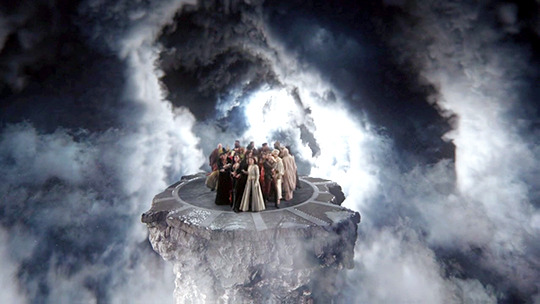
this is the sort of thing you’ve got to foreshadow at least a LITTLE
The acting was pretty damn good, though.
(Fair warning: don’t open this on mobile, there’s a ridiculous amount of pictures under the cut)
OK. So. Couple of things that I really liked up front, so I can gripe in peace later on. (And readers can skip whatever part they wish ; )
First, and I realise this is a weird thing to enjoy, but I loved how utterly despicable I found Fiona in this one. She may have hung around like a bad smell for most of the season without really doing much, but she sure stepped up her game for the occasion.
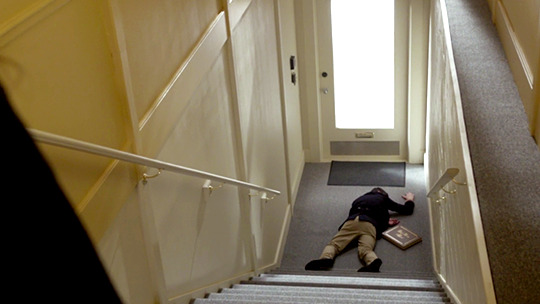
Seriously, if Rumple hadn’t killed her, I would have found a way. “Our son”, indeed.
Though, please, have some pity on the poor guy. At this point, he has killed both his parents, and one of them twice. That can’t be good for anyone.
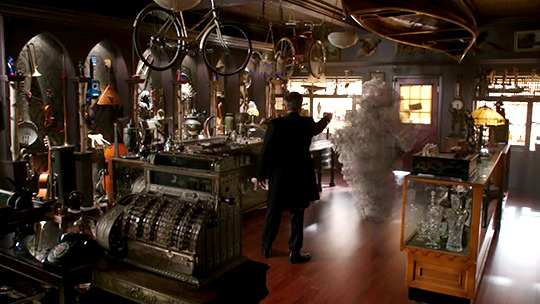
oh look the wall robots are still there
And speaking of Rumple… dang, that was a good scene in the mines. What I loved most about it was that this was literally all him. Nobody would ever know what he did in there if he didn’t tell them, except for himself, and he still made the right choice. Despite being offered everything he ever wanted, despite being under the influence of his curse just as much as ever…
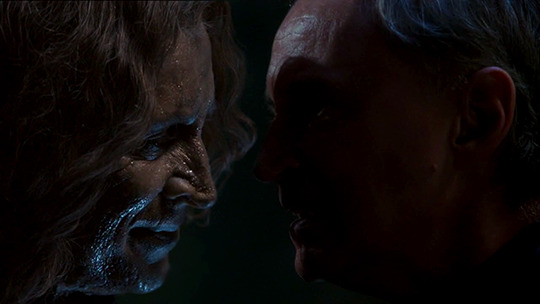
before you ask, yes, my mind did go Places
…and more literally than it’s usually shown. Well done, pal. I should probably be more excited about this, but despite the tense buildup, I feel like the scene kind of fizzled as a whole. Maybe because he already made the exact same choice earlier, and was just confirming that he really meant it, too. Still, it was a good moment, and I was very proud of this walking human disaster by the time it was done.
Some more on the topic of Rumple: congratulations on his acting skills. Rumple’s, not Robert Carlyle’s, specifically. Because there’s no way in hell I could have seen these photos…
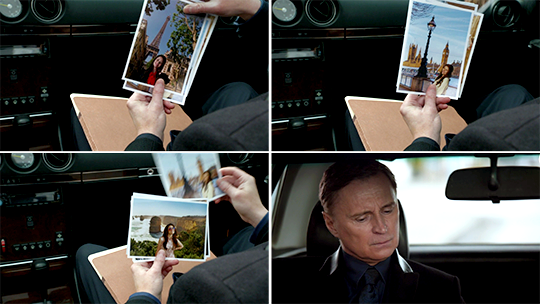
…and kept a straight face. Honestly, I’m half convinced that they were a test by Fiona to see if he was awake after all.
Oh, and the book!
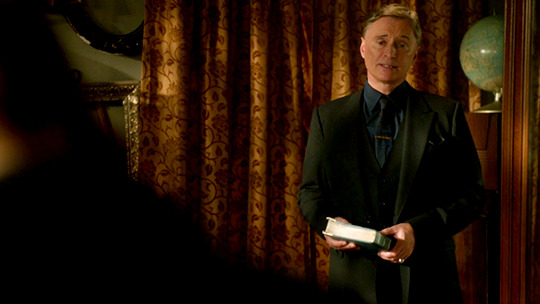
The book made it across! And you know why? Because Belle and her son have True Love, even if Gideon cannot remember that, because Fiona is The Worst. And Rumple worked so hard to make Gideon remember; it was heartbreaking to see. I mean, he had to do that for… what? Five hours? And he still couldn’t stand the thought that Gideon might believe his mother didn’t love him. It was a good scene, OK?
On a sillier note (but still unambiguously positive): Emma’s wardrobe came back for the finale!
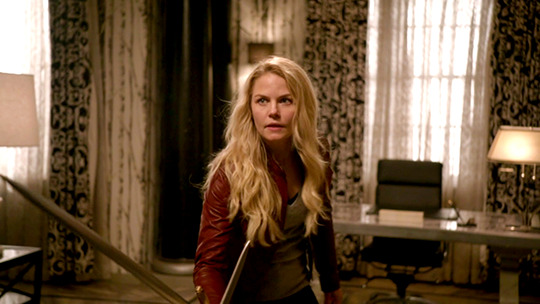
I don’t know, it’s just nice to see.
Other things I loved a lot:
Any and all interactions between Regina and her now-settled other half. Just. Pure joy, even in the midst of the wtf-ery. And with the obvious standout-moment when the Queen goes and sacrifices herself to give the others that tiny bit of time they need to get back to their world and help Henry (and Emma, but I think we all know who the priority was in this case)
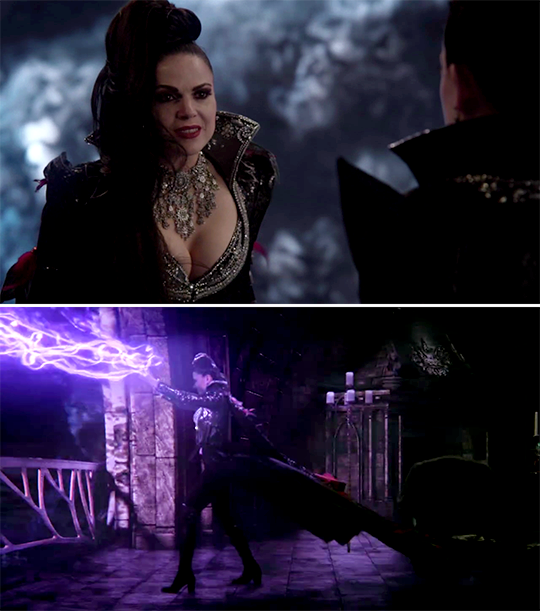
Just… damn. I’m still worried about this woman’s self-destructive streak in general, but this was a good moment. (It also helps that she got better. ‘cause that could have been really depressing otherwise.)
Oh, and since we’re speaking of Regina (or the Reginas, plural), I absolutely adored the speech she gave Emma. Just… I mean, I expect the hope speeches from Snow (and that one was pretty good, too), but this? I mean… wow. Please compare and contrast with season 1. Except you don’t have to, because Regina already did that, and it was beautiful.
Then we have an actual mirrored TLK (see below for a botched version…) in this very good moment:
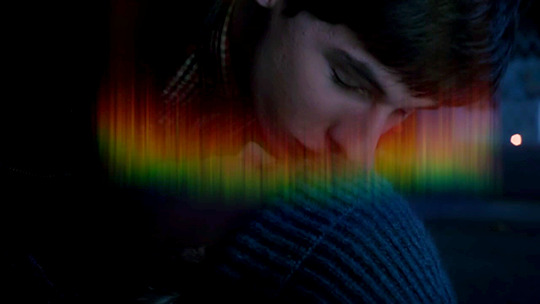
Like, yes, I love bookends, and this was a great one. Calling back to the “holy crap why didn’t I see this coming” kiss in s1 worked surprisingly well, considering how little interaction Emma and Henry had this season, but there’s enough material in the show in general to make me buy into this. Like I said: sucker for bookends.
In general, I feel like this episode was at its strongest whenever re-focused on the family relationships between the characters.
And to close it out, the ending montage.
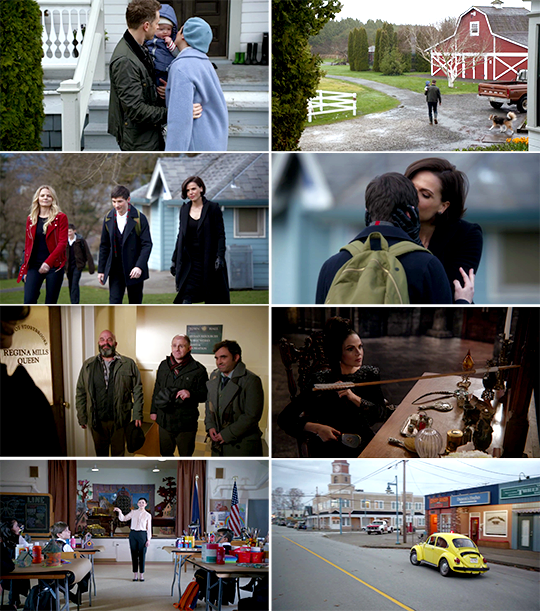
Just... it’s like Snow said. They get to live their happy endings now. Snowing finally have the time to be a proper family (and David got a dog!). Regina is accepted and loved by her people (and the Queen gets to have a completely “new adventure”, as Robin so aptly put it.) Snow can do what she loves and doesn’t have to fight all the time anymore. And Emma finally has a place in the world; one where she can settle and be comfortable and doesn’t have to be alone anymore... and I’ll just leave it at that. It’s a good ending.
And no, I haven’t forgotten it--obvious special mention to this bit here:
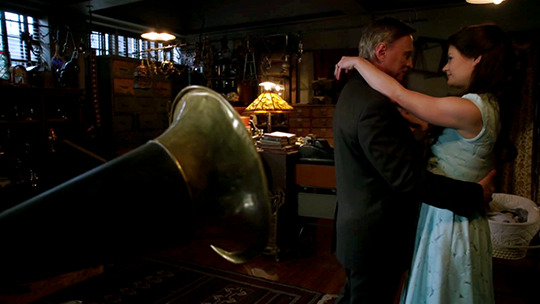
Yup. Killed me dead. And I died happy, thank you very much. They’ve been through so much bullshit, and now they can be together, and raise their son in peace, and won’t be really worried when he doesn’t stop growing, either.
I also want to give a special shoutout to the five six people who immediately made sure that I knew that 1) the kiss wasn’t scripted and 2) we, as a fandom, are extremely lucky to have Robert and Emilie. (For those who haven’t seen the interview in question, it’s here, and here)
The finishing dinner was nice, too, even if I’m not sure what the whole Last Supper imagery was supposed to do.
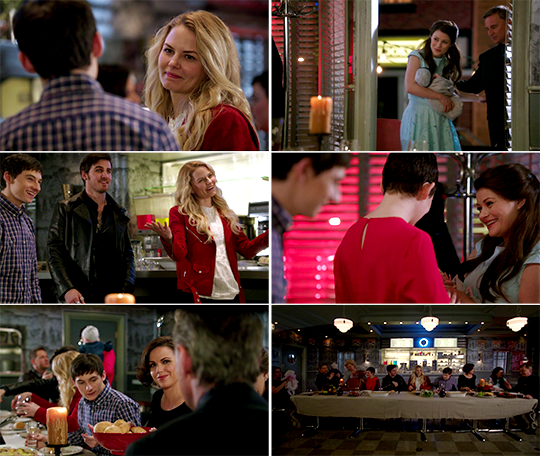
Listen, I’ve been going “just let them be happy!” for way too long to complain much when they finally are. Also, I could write an essay on the range of emotions Rumple goes through when he comes through that door and people are actually happy to see him and his family. Or about that look that passes between him and Regina, because I caught that and it made me cry! I don’t think either of them ever imagined they would really be this happy again when they first met and they’ve been through so much crap and just... guh. I like this. It’s a good closing shot.
And now, the rest.
Because frankly, this wasn’t a great finale. It wasn’t even that good of an episode. It was everything wrong with the 4B finale, only more of that.
For example: What was the deal with making Emma lose her belief? Since when was her belief required for the magical realms to exist? The only person who’s ever had even something approaching that function was Henry. She didn’t need to believe in magic to keep it alive, she needed it to break the curse.
And this was never set up as the Black Fairy’s plan. Not even a little. This came so out of left field, it wasn’t even in the same stadium! And it’s so frustrating, because this wasn’t a bad plot, as such, but there was no build-up, no real payoff, nothing. Or, let me put it differently: this was a perfectly fine plot resolution, it just had no business being attached to this season.
Everything felt rushed, there were about five dozen plot points, none of them with any time to breathe and somehow, we still got that terminally boring climb up the bean stalk.Sorry, David, you know I love you, but what was the point of that sidetrack? Nothing happened. There was no try-and-fail cycle (because there wasn’t time for one) and honestly, if you needed a handwave for how they got back from the magical realms, maybe you could have gone with a less time intensive one?
And that moment where Snow kisses David back to life? Yeah, unearned, again. And dear show: the cut-in from the first episode worked for the split-heart curse, because you were subverting it. But here? It just didn’t do anything. This wasn’t a parallel. David wasn’t cursed, he was crushed by a beanstalk.
And speaking of things that don’t make sense…
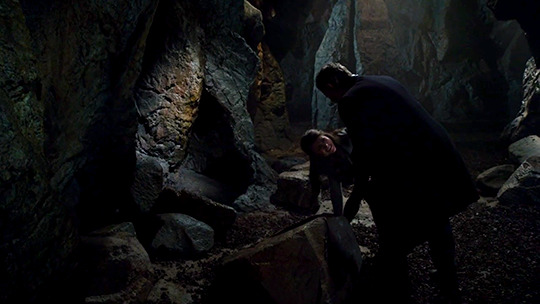
For the love of fuck. Her ankle? Really? This is such a cliché that even the slasher genre doesn’t do it anymore. And it’s a dumb cliché, too. It’s rooted sexism and it makes it look like you didn’t have any other ideas. I get it, you don’t want Belle with Rumple at that final point so she doesn’t influence his decision. Here’s a thought, then: let her stay behind for a good reason! Or, hell, if you don’t want to write a scene for her (the writers sure seem to be allergic to giving Belle any screentime), let there be a fork in the road! They don’t have the time to check each one, let Belle go one way and Rumple another. It’s still a lazy plot excuse, but at least it’s not the stupidest cliché in the book.
And one more thing…
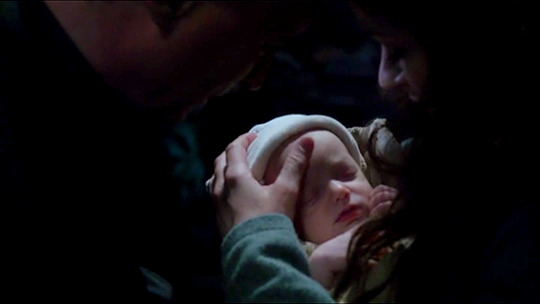
::sigh:: I have such mixed feelings about this?
Because on the one hand: Gideon had a life that nobody would want. He was kidnapped, imprisoned, kept in the dark and abused for all of his twenty-eight years, and even if he got free, he would never get that time back. Nobody would ever choose that for themselves.
At the same time… Gideon died. The person I got to know over the last half-season is no more. He’s gone. And he never had any say in the matter. Hell, he didn’t even get to say goodbye. It’ just such a messed-up way to get a wonderful thing.
(Also, while I’m on that topic��� yes, I did notice that Rumple didn’t recognise his very tiny son at first, and I realise that it’s because he’s never seen him before. It prompted a particularly long “oh noo…”, too.)
And finally…
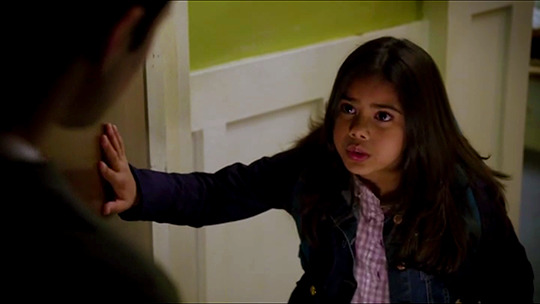
… that cliffhanger/teaser, though, huh?
I have so many questions. Why was Henry in that monster forest? Why is he now in an apartment and doesn’t remember his daughter? When did he get a daughter? (Also, who with? Enquiring minds would like to know.)
So. I know, like, three things about s7, and one of them is the cast list. Please try not to spoil anything else, because that’s already way more than I wanted to know going in. Seriously, I’m a reasonably grown adult. I can deal with a couple of surprises.
#ouat#once upon a time#ouat the final battle#sieben watches ouat#sieben talks#ouat writing critical#anti cs#anti hook#(by implication mostly)
42 notes
·
View notes
Text
Lovestruck Series Review: Starship Promise (Season 1)
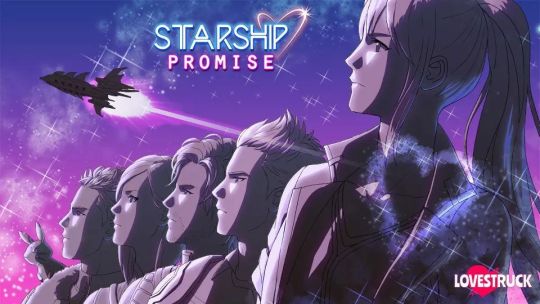
Personal playing order: Orion - Jaxon - Antares - Nova - Atlas
Warning! Minor spoilers ahead for Antares’s/Nova’s/Atlas’s routes, as well as CGs under the cut.

Orion: I’m torn on this one. I really enjoyed the story -- a lot more than I thought I would, given my lack of enthusiasm for the series concept -- and Orion himself. (If anyone ever wanted Shang from Mulan but in outer space, this is it.) The writing also had a very natural cadence and flow; it pulled me in easily, never getting too heavy-handed with sudden plot twists and cliffhangers... except for one instance, but more on that below.
And the MC! She was a pleasant surprise. I hadn’t been too impressed by her in the first-ep sneak peeks we get in each route, but she’s really cute -- she can be a bit of a space cadet at times (sorry, bad pun intended), but she isn’t dumb. Furthermore, she really develops over the course of the route, which is impressive given everything else stuffed into these mere 12 episodes.
So now to the things I didn’t like about this route: for one, the romantic development. It seemed really sudden and almost shoehorned-in as a result of the route length, which was jarring given how well-paced everything else had been up to that point.
Also, the Antares plot twist; it felt cliché and gimmicky, especially since I could see it coming from a mile away. I think I would’ve preferred for it to be a Season 2 reveal, or at least presented to us right from the start -- as it was, it just seemed like it was there for the “shock factor” + to forcibly give us a reason to care about the antagonist if we didn’t already. But since this was a pilot season, I guess I can understand how they wanted to tease at an intriguing backstory as early as possible to get players invested.
Overall, they still did succeed with the latter, because now I’m pretty curious about where they’re going with this. And also because I need more Orion/MC in my life; rushed or not, those two are simply way too cute.

Jaxon: Whoa, this story was jam-packed with action scenes and chemistry between the OTP. The pace is hella fast, but you never get the sense that we’re skipping past important details; the writing makes the most of every episode it has got. Not a single scene is wasted or filler-like.
Jaxon himself is a bit of a harder sell. His gargantuan ego, jokester personality, and YOLO take on everything make him one of those characters that you either love or hate -- although for me, he fell somewhere near the middle of the spectrum. I like his concept and find him a refreshing addition to Lovestruck’s character lineup, but he’s not really my type as far as romance goes; and sometimes he toes the line for being near annoying.
(The fact that I constantly seemed to make the wrong choices -- at least judging by the sheer amount of weird looks or lukewarm responses he gave me after 90% of my choices -- didn’t help. Heads-up: don’t try to play it cool. This MC really, really can’t do cool. I had several near-death experiences from sheer secondhand embarrassment while playing this route.)
That aside, he makes a surprisingly good team with MC. Except from some cringey non-heart options (which were brutal this route, by the way), they naturally eased into working as a combo. I like how they both are able to pull each other out of their respective emotional ruts, as well as complement the other’s shortcomings. Jaxon’s character turnaround near the end felt a little sudden, but I like the teased insight on his past, and am looking forward to learn more about it.
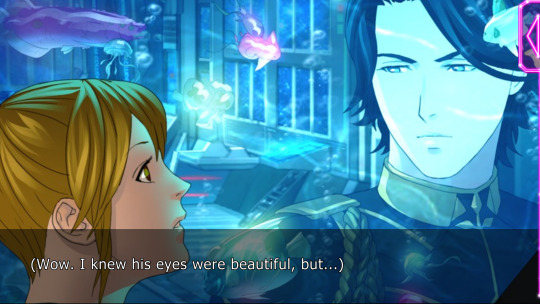
Antares: Oh, MC. Trust me, I of all people totally understand crushing on the hot, mysterious, and possibly noble anti-hero holding you captive for unknown reasons, but even so. Being constantly unable to focus on anything but your attration to him -- and using it as a basis for your foundation to trust him almost straight away despite how he works for the Big Bad, and is literally using you as a tool(-fixer) for whatever evil purposes the Empire has in mind for the galaxy -- is like a whole new level of uncool.
(Also, how is a sheltered colony girl’s reaction to seeing a military leader telling his troops not to leave a single ship standing “swoon, he’s so charismatic” instead of “holy shit, he kills people”? Priorities, MC.)
Beyond that, Antares’s route was very intriguing to me. Out of Lovestruck’s villain routes so far this is the one that has done the least to paint the love interest as less of an antagonist, or the side he sympathizes with as more morally grey. I also appreciated seeing another side of Antares himself that actually knows the definition of the word chill isn’t perpetually dressed in bunny-ear mecha armor that’s not completely absorbed by his thirst for vengeance against his brother.
Similar to Orion’s route, the romantic development also dropped on us out of the blue here... but strangely, I didn’t mind. In a way, it seemed to make sense for Antares’s emotionally dysfunctional personality (to the point that it gave me Chance S1 in GiL flashbacks). I think I almost preferred this to him doing a sudden 180 and going all mushy on MC when any potential romantic build-up outside of premium choices has been minimal. I’m holding my thumbs now for a gradual turnaround -- much like Chance got -- in his future seasons.

Nova: I keep going back and forth re: how I feel about this route. To again start with the positive -- I’d been worried that Nova would be a Space Medusa 2.0, so I was pleasantly surprised to find that she wasn’t. For all the kuu in her kuudere demeanor, Nova still spends a fair amount of the route bonding with MC through actual conversation, and unlike Orion’s/Antares’s routes this season the romance didn’t even seem that rushed. Furthermore, I was intrigued by Nova’s backstory (not to mention that she’s hot as hell).
But to be entirely honest, this story is also the most formulaic, “typical otome”-esque route I’ve read so far in Lovestruck -- not so much in concept as in execution. It reminds me of one of those Voltage JP fantasy routes where we spend the first 1/3 of the route with semi-slice-of-life scenes interspersed with action, the middle 1/3 of this route discovering the LI’s angsty past and them distancing themselves to protect MC, and the final 1/3 with MC dissolving into hysterics/apocalyptic depression, stupidly running after LI alone, and declaring their undying love for them after having known them for a couple of days in the middle of a life-or-death situation.
Since I do play Voltage JP games I’m not saying it’s necessarily a terrible thing, just... jarring. I might seem like I’m awfully hard on Lovestruck’s writing a lot of the time, but that’s because I have high expectations of it. In a sea of near-identical mobile otome clones Lovestruck stands out with a more Westernized and creative take on standard otome tropes, hence often avoiding common pitfalls associated with the genre. The writing in general is a cut above what I expect from mobile games as well, hence all my criticisms; I don’t balk (as much) at LIs doing sudden 180s or MCs being stupid in a Solmare game, but I do with Lovestruck because I know -- and have seen firsthand -- that they can do better.
So this route was confusing to me. Because, if I were to go for my usual standard from what I would expect run-of-the-mill Voltage JP route, for example, or a Shall We Date? one -- then I’d think it’s fine. Or even good. But for Lovestruck? I don’t know. I wouldn’t say it’s bad, just not... good. (The GiL-esque Pokémon-battle narration for action scenes -- yes, this is my official pet peeve now -- didn’t help.)
With all that said though, I didn’t dislike Nova’s route. (Hence the confusion.) And definitely not Nova herself. I just don’t really know how I feel about its writing direction, and how it measures against my expectations of a Lovestruck route.

Atlas: I fell head over heels for this route. Seriously, this was Astraeus-in-season-3-of-AFK level instant love, except without the devastating angst and with a decent helping of fluffy feels on top. Not that it was all fluff -- we had our share of prospective angst here too, if less literally earth-shattering. And hell of a lot of action, character development, and tons of other goodies tightly stuffed in a 12-episode-package of awesome.
Similar to my review for Astraeus, I don’t even know where to begin talking about this route’s good points. The prose, for one -- there were just so many beautifully worded narrative transitions, and the dialogue didn’t lose out in that aspect, either. The sass, sarcasm, and the humor were well-timed, but didn’t go overboard/seem out of character for MC or the rest of the cast.
Then there’s Atlas himself. Breaking down tsunderes is one of my favorite otome pastimes, and doing exactly that to our resident grouchy pilot was no different. First of all, I love that he maintains a healthy balance between insults that are obviously all bark and no bite, and genuinely worded criticism that should logically be voiced. In fact, there’s so little unnecessary tsun here that he could almost pass for a kuudere.
Regardless of whatever mold he’d better fit into, finally crumbling down that cranky demeanor of his and seeing him dere was a sweet, sweet reward. (I actually caved and went premium twice despite my agonizing wallet because I couldn’t resist seeing more of it.)
Or heck, even the platonic moments building up to that were great. Because the romance with Atlas was really well-paced; I love how we went from almost-hate (my favorite trope!) to begrudging respect, then to friendly equals/teammates, and finally something more -- all the while there was obvious chemistry between him and MC interlacing every interaction. I was kind of worried whether we’d get some last-minute romantic confession slapped on near the end, but thankfully we got a development that, for all its unrealistic corniness, still had me squealing. Especially with that cliffhanger; dammit, how am I even supposed to emotionally last until I get to his second season?
The main plot was really interesting, too -- probably my favorite premise out of the ones we’ve been offered so far. Even though it starts out similarly with MC on the run, I like how 1) we see the Union as evil right from the bat, avoiding having another MC-gets-out-of-her-naïve-colony-girl-mindset mini-arc; 2) rather than being perpetrated for some valuable information/artifact that the Starship crew might benefit from, MC is in a situation where they actually have no reason to keep her around, adding more tension to the intro; and 3) how all of this tied into Atlas’s own personal character arc. (Not that I minded how the other premises played out, it just made for a fresh change of pace.)
To wrap this gigantic word-vomit ramble up, I’d just like to conclude by gushing one last time how fantastic this route is -- I’d warmly recommend it to anyone interested in giving Starship a chance, because after this, the series personally had me hook, line, and sinker.
Final character ranking: Atlas > Orion > Jaxon > Antares > Nova
....This got a little longer than I intended it to be, oops. Kudos to anyone who has made it to the end of this season review. (I’ll try to be a little more concise in my next one, i.e. GiL S7.) You can follow my tag #coco reviews lovestruck for more reviews of Lovestruck games, or check out the ones I’ve done so far on this list.
#coco reviews lovestruck#lovestruck#voltage usa#amemix#starship promise#orion akatsuki#jaxon silva#antares fairchild#nova#atlas molniya#oelvn#mobile otome#otome review
28 notes
·
View notes
Text
stranger things theory: Evil El. (s3 & s4)
So guys I just binged all of s2 recently (actually I went back and rewatched from the beginning once I finished) but I’ve got A LOT of things to discuss and these will bring us into my theory for the seasons.
ALL SPOILERS FROM s1 AND NEWLY RELEASED s2 FOLLOW AFTER THIS
TAKE PRECAUTIONS
———————————
——————————–
——————————–
FINAL WARNING
————————
——————————–
———————-

I want to refresh your memories with a few details back in s1. My theory goes along with another popular fan theory about Eleven & the Demogorgon being psychically linked with each other. Although, my theory will bounce off into its own direction I can assure you.
Basically there were loads of parallels: (My mind was BLOWN from this theory!) that suggested their link.
1.) Each time Eleven made contact with Will through the upside down suddenly the Demogorgon followed.
The first time was at the school with the radio. El found Will and from the Upside Down POV, Will was alone talking to his mom through the wall. El was listening in but as she struggled to keep the connection the lights flickered uncontrollably and soon Will had to run from the Demogorgon.
The second time this happened as El made contact through the void with Will. Weak and cold in his fort, she passed on the message from his mom but soon lost contact. The final moments of that episode we see Will as he was in his fort but the Demogorgon yet again finds his location and snatches him.
2.) In 1x02 as Mike shows El his room, she locks eyes on their science fair picture as a group and then points to Will without ever meeting him. In 1x03 Barb is taken and that same episode El goes exploring Nancy’s room and locks eyes with a picture of Nancy and Barb. How did she know?
3.) Both Demogorgon and Eleven share telekinetic abilities.
On the night Will goes missing while in his house, the Demogorgon uses telekinesis to slowly unlock their front door.
4.) The final scene of the s1 finale, we see Eleven face to face with the Demogorgon pinned up against the wall about to destroy it and we also notice as its destroyed, Eleven is ‘seemingly destroyed’ too.

(now HERE is where I started connecting pieces forming my theory to come.)
I noticed instantly as Eleven has it pinned as she raises her right arm suddenly the Demogorgon mimics her in sync. As if they were really connected. THEN it hit me. What is the Upside Down? It’s an alternate dimension BUT in parallel with the human world and it mirrors it EXACTLY. The Demogorgon is a mirrored image of Upside Down Eleven.
Our Eleven is a scared little girl, abducted by Scientists as a weapon, and has been experimented on her whole life. Has gone through a lot of emotional trauma and abuse. Also she has A LOT of built up rage.
Whose to say that the Demogorgon isn’t a failed experiment by Scientists who sought out to make it into a weapon? So thinking about that, these two worlds were NEVER supposed to co-exist with each other. So when Eleven dives deeper into the void, she got a glimpse of the parallel world. However touching it was a BAD choice, she interacted with her equal and just like any paradoxes a crack was formed and both worlds combined. Basically, as long as Eleven and her powers exsist, the upside will be able to get through.
Intrigued yet? We finally reached the start of my theory. Created after my third rewatch of season 1 and based off of the comic that Will requested when he won the race to Dustin’s. “I’ll take your XMEN 134!”
Well that particular issue centers around Jean Grey who shares Telekinetic/telepathy abilities just like Eleven. However also in that comic, Jean gets manipulated by Master Mind (villain with powers of illusion) and eventually she turns into the Dark Phoenix.
Stranger Things season 2:
We are introduced to a new monster whom the boys quickly name as The Mind Flayer. Starts off by showing Will visions of what’s to come (Coming to their world) and then it inhabits his body to use him as a spy. We learn that it thinks as a hive mind and has been in control of the Demogorgons as well. So it’s been the real MASTER MIND.
We also learn that its been seeping the Upside Down into the real world because the gate has not been closed FOR. A. WHOLE. YEAR! The finale is Eleven gathering enough power to finally ‘close’ the gate. She actually levitated (also something Jean Grey did as Phoenix).
BUT the final scene of that episode as we pan out of the real world Hawkin’s Snowball dance, the scene rotates around and reveals The Mind Flayer stalking over their school. So now it has a real target as their group or one particular person.
(cue “I’ll be watching you”)

THEORY TIME:
He’s going after Eleven and not just because she was powerful enough to close the gate. Now that The Mind Flayer has peaked into their world, he’s either out to destroy it or take over. What Will seen will happen and the Mind Flayer is going to start by manipulating Eleven. Forming her into his own weapon. (Like the ultimate papa)
Once you interact with The Upside Down you are essentially part of it so to the Mind Flayer, you are his property. But before he can come to their world, he has to create the right atmosphere which is why The Upside Down was seeping into Hawkins.
Besides Will and Eleven, these others might be in danger:
1) Dustin - interacted with the Upside Down through Dart and got sprayed by the flower inside the tunnel. (Will it infect him too? Since it did get into his mouth…)
2) Hopper - Almost choked to death by the vines.
3) Mike - Almost taken by the vines.
So one of them could be infected.
I believe the Mind Flayer is going to corrupt Eleven where she becomes evil. Think about it: Eleven is going to be isolated for a year so they can be sure it’s safe for her to start a normal life and during this time, her powers are gonna grow to massive amounts. She is already limited to using her powers because she’s still learning control. Not to mention her powers are tied to her emotions, she’ll eventually be in HS and vulnerable to a lot of teen angst AND strong feelings between her and Mike…..so the Mind Flayer is going to use all this to his advantage. ESPECIALLY her feelings of Mike.
Pretty sure the Mind Flayer will be particularly interested in messing with Eleven, through messing with Mike. I definitely feel this is the next storyline and the Duffer Bros did say the Mind Flayer is sticking around.
Once Eleven is manipulated Hawkins is going to find out about her abilities and view her as a threat, they are going to try to stop her. EVERYTHING Hopper has tried to give to El; A normal life, a safe place, friends, family will be jeopardized but it's not gonna be her fault....it's the Mind Flayer. (If you look at this through E.T POV since this show is also heavily inspired by that movie too, the government tried to stop E.T. as well.)
(personally i want this to be a huge cliffhanger to s3, carrying into s4 because honestly, as much as I love this show you really can’t up The Mind Flayer because that’s already BA enough. Duffer Bros can TOTALLY prove me wrong about that though)
So in the off chance this does take us into s4 or however long until the show ends entirely we are going to meet the other Xmen. (missing/abducted children). Meeting eight was no coincidence, that’s where the show will take us. In the end its going to take the help of Eleven and her other siblings to stop the Mind Flayer I bet. One huge telekenetic war.
- Theory girl
64 notes
·
View notes
Text
My entire family ships B*uffy and A*ngel. Haha... Well, for the most part. Though originally, I was a S*puffy. And it was in trying to figure out what everyone else saw in B*angel--and giving it some deep thought for a long time--that what the writers were going for with them finally clicked with me, and then I thought they were the most beautiful thing. And I’ve recently gotten my sister into B*tVS. And at first, I don’t know if she was going to like them that much. Because she came over one night and was like, “Can we talk about how fast the B*uffy and A*ngel thing escalated?” And tbh, I still feel that way myself and wish it had been a bit different. My only gripe I still have with them, is that I do think they were rushed (at least in season one. Season two actually builds up their relationship more), but oh well. But then I explained to her why I like them, and now she’s completely Team B*angel (and was happy when my uncle visited--who told us we should watch B*uffy a long time ago) said that he ships B*uffy with A*ngel when she asked him. My mom, on the other hand, somehow ended up at my house a lot when I was watching A*ngel the Series and loves him (so she hasn’t seen B*uffy yet). And from what she’s seen of B*uffy on A*ngel, she doesn’t like her (to be fair, I also think A*tS kind of does a terrible job of displaying B*uffy) and she ships C*angel. But I feel she’ll ship B*angel when she one day watches B*uffy. Since C*ordy is a dark reflection of B*uffy, and towards the end of A*tS they were making her B*uffy more and more, tbh.
Also... my entire family--and everyone I know in RL--are Max and Logan (Lomax) shippers when it comes to Dark Angel (and most of us hate S2, tbh. With me being the most okay with it now, tbh). But I prefer Lomax and always have and always will, my sister does, said uncle does (and tried to warn us against watching S2. He’s actually the one who got us into this show). My sister’s old friend, Juanita does... And my friends Danielle and Rachel, I think (back then, I told both of them not to watch S2--and Rachel just took my word for it--but Danielle understandably wanted to watch S2 because S1 ended on such a big cliffhanger. So I lent her to it, and she couldn’t even get through the first episode... which is one of the best S2 ones. And she told me that I was right and that that fast she could feel the tone shift and she didn’t like it. And my boyfriend who I recently watched it with--and actually watched S2 with, as I’m done making people’s decisions about S2 for them--loves Lomax (and doesn’t get why MaxAlec is so big... and none of us do. He actually has a lot of issued with Alec). And while he ended up liking S2 in the end, and thought it was worth it (probably because I was there to talk about the good parts of it with him), he still vastly prefers S1... as I do. As we all do. And he said Lomax is now one of his favorite pairings from the 90′s era. Because even though it came out in 2000, he thought that was close enough to the 90′s--and still kind of felt like the 90′s--and was counting it for that reason. As for my mom, this is a show Ashton (my sister) and I got so into back in the day, that we were bad and didn’t wait for her to be around to finish it with us. So she hasn’t seen most of this show, but some of it. Oops.
#my uncle legit has watched every tv show for so many years now--at least giving them a try I mean--so he's this huge tv buff and reviewer#my uncle is so nerdy and cool and always has been. haha. I love him. he also used town a comic book store and goes to cons and stuff#tbh the majority of the shows I've gotten into are because of him. he has good taste and knows what he's talking about since he's watched#like everything#I should probably mention that boyfriend's watching buffy now. and while I think he likes bangel he thinks they're forced too#at least at first#so it'll be interesting to see how he feels about everything when he finishes it#my friend Rachel watched it long before I btw. and she's a spuffy. so that's one we don't have in common#my friend Danielle has tried to watch buffy--because she knows it's amazing--but can't get past s1 which is understandable#I'm trying to tell now to just skip s1. and maybe watch passion of the nerd's coverage of it. and go right to s2. haha#also my uncle hasn't watched buffy in forever. so it's kind of impressive he remembers it enough to be so assured when he's like#'yeah. buffy belongs with angel over spike'#but even though I do think buffy and angel escalated kind of quickly it is NOTHING compared to how fast tv show couples escalate today
0 notes
Text
Westworld: (De)Humanising the Other RSS FEED OF POST WRITTEN BY FOZMEADOWS
Warning: total spoilers for S1 of Westworld.
Trigger warning: talk of rape, sexual assault and queer death.
Note: Throughout this review, it will be necessary to distinguish between the writers of Westworld the TV show, and the writers employed in the narrative by the titular Westworld theme park. To avoid confusing the two, when I’m referring to the show, Westworld will be italicised; when referring to the park, I’ll use plain text.
*
This will be a somewhat bifurcated review of Westworld – which is, I feel, thematically appropriate, as Westworld itself is something of a bifurcated show. Like so much produced by HBO, it boasts incredible acting, breathtaking production values, intelligent dialogue, great music and an impeccably tight, well-orchestrated series of narrative reveals. Also like much produced by HBO, it takes a liberal, one might even say cartoonishly gratuitous approach to nudity, is saturated with violence in general and violence against women in particular, and has a consistent problem with stereotyping despite its diverse casting. In Westworld’s case, this latter issue is compounded as an offence by its status as a meta-narrative: a story which actively discusses the purpose and structure of stories, but which has seemingly failed to apply those same critiques to key aspects of its own construction.
The practical upshot is that it’s both frustratingly watchable and visibly frustrating. Even when the story pissed me off, I was always compelled to keep going, but I was never quite able to stop criticising it, either. It’s a thematically meaty show, packed with the kind of twists that will, by and large, enhance viewer enjoyment on repeat viewings rather than diminish the appeal. Though there are a few Fridge Logic moments, the whole thing hangs together quite elegantly – no mean feat, given the complexity of the plotting. And yet its virtues have the paradoxical effect of making me angrier about its vices, in much the same way that I’d be more upset about red wine spilled on an expensive party dress than on my favourite t-shirt. Yes, the shirt means more to me despite being cheaper, but a stain won’t stop me from wearing it at home, and even if it did, the item itself is easily replaced. But staining something precious and expensive is frustrating: I’ve invested enough in the cost of the item that I don’t want to toss it away, but staining makes it unsuitable as a showcase piece, which means I can’t love it as much as I want to, either.
You get where I’m going with this.
Right from the outset, Westworld switches between two interconnected narratives: the behind-the-scenes power struggles of the people who run the titular themepark, and the goings-on in the park itself as experienced by both customers and ‘hosts’, the humanoid robot-AIs who act as literal NPCs in pre-structured, pay-to-participate narratives. To the customers, Westworld functions as an immersive holiday-roleplay experience: though visually indistinguishable from real humans, the hosts are considered unreal, and are therefore fair game to any sort of violence, dismissal or sexual fantasy the customers can dream up. (This despite – or at times, because of – the fact that their stated ability to pass the Turing test means their reactions to said violations are viscerally animate.) To the programmers, managers, storytellers, engineers, butchers and behaviourists who run it, Westworld is, variously, a job, an experiment, a financial gamble, a risk, a sandpit and a microcosm of human nature: the hosts might look human, but however unsettling their appearance or behaviour at times, no one is ever allowed to forget what they are.
But to the hosts themselves, Westworld is entirely real, as are their pre-programmed identities. While their existence is ostensibly circumscribed by adherence to preordained narrative ‘loops’, the repetition of their every conversation, death and bodily reconstruction wiped from their memories by the park engineers, certain hosts – notably Dolores, the rancher’s daughter, and Maeve, the bordello madame – are starting to remember their histories. Struggling to understand their occasional eerie interviews with their puppeteering masters – explained away as dreams, on the rare occasion where such explanation is warranted – they fight to break free of their intended loops, with startling consequences.But there is also a hidden layer to Westworld: a maze sought by a mysterious Man in Black and to which the various hosts and their narratives are somehow key. With the hosts exhibiting abnormal behaviour, retaining memories of their former ‘lives’ in a violent, fragmented struggle towards true autonomy, freedom and sentience, Westworld poses a single, sharp question: what does it mean to be human?
Or rather, it’s clearly trying to pose this question; and to be fair, it very nearly succeeds. But for a series so overtly concerned with its own meta – it is, after all, a story about the construction, reception and impact of stories on those who consume and construct them – it has a damnable lack of insight into the particulars of its assumed audiences, both internal and external, and to the ways this hinders the proclaimed universality of its conclusions. Specifically: Westworld is a story in which all the internal storytellers are straight white men endowed with the traditional bigotries of racism, sexism and heteronormativity, but in a context where none of those biases are overtly addressed at any narrative level.
From the outset, it’s clear that Westworld is intended as a no-holds-barred fantasy in the literal sense: a place where the rich and privileged can pay through the nose to fuck, fight and fraternise in a facsimile of the old West without putting themselves at any real physical danger. Nobody there can die: customers, unlike hosts, can’t be killed (though they do risk harm in certain contexts), but each host body and character is nonetheless resurrected, rebuilt and put back into play after they meet their end. Knowing this lends the customers a recklessness and a violence they presumably lack in the real world: hosts are shot, stabbed, raped, assaulted and abused with impunity, because their disposable inhumanity is the point of the experience. This theme is echoed in their treatment by Westworld’s human overseers, who often refer to them as ‘it’ and perform their routine examinations, interviews, repairs and updates while the hosts are naked.
At this point in time, HBO is as well-known for its obsession with full frontal, frequently orgiastic nudity as it is for its total misapprehension of the distinction between nakedness and erotica. Never before has so much skin been shown outside of literal porn with so little instinct for sensuality, sexuality or any appreciation of the human form beyond hurr durr tiddies and, ever so occasionally, hurr durr dongs, and Westworld is no exception to this. It’s like the entirety of HBO is a fourteen-year-old straight boy who’s just discovered the nascent thrill of drawing Sharpie-graffiti genitals on every available schoolyard surface and can only snigger, unrepentant and gleeful, whenever anyone asks them not to. We get it, guys – humans have tits and asses, and you’ve figured out how to show us that! Huzzah for you! Now get the fuck over your pubescent creative wankphase and please, for the love of god, figure out how to do it tastefully, or at least with some general nodding in the direction of an aesthetic other than Things I Desperately Wanted To See As A Teengaer In The Days Before Internet Porn.
That being said, I will concede that there’s an actual, meaningful reason for at least some of Westworld’s ubiquitous nudity: it’s a deliberate, visual act of dehumanisation, one intended not only to distinguish the hosts from the ‘real’ people around them, but to remind the park’s human employees that there’s no need to treat the AIs with kindness or respect. For this reason, it also lends a powerful emphasis to the moments when particular characters opt to dress or cover the hosts, thereby acknowledging their personhood, however minimally. This does not, however, excuse the sadly requisite orgy scenes, nor does it justify the frankly obscene decision to have a white female character make a leering comment about the size of a black host’s penis, and especially not when said female character has already been established as queer. (Yes, bi/pan people exist; as I have good reason to know, being one of them. But there are about nine zillion ways the writers could’ve chosen to show Elsie’s sexual appreciation for men that didn’t tap into one of the single grossest sexual tropes on the books, let alone in a context which, given the host’s blank servility and Elsie’s status as an engineer, is unpleasantly evocative of master/slave dynamics.)
And on the topic of Elsie, let’s talk about queerness in Westworld, shall we? Because let’s be real: the bar for positive queer representation on TV is so fucking low right now, it’s basically at speedbump height, and yet myriad grown-ass adults are evidently hellbent on bellyflopping onto it with all the grace and nuance of a drunk walrus. Elsie is a queer white woman whose queerness is shown to us by her decision to kiss one of the female hosts, Clementine, who’s currently deployed as a prostitute, in a context where Clementine is reduced to a literal object, stripped of all consciousness and agency. Episode 6 ends on the cliffhanger of Elsie’s probable demise, and as soon as I saw that setup, I felt as if that single, non-consensual kiss – never referenced or expanded on otherwise – had been meant as Chekov’s gaykilling gun: this woman is queer, and thus is her death predicted. (Of course she fucking dies. Of course she does. I looked it up before I watched the next episode, but I might as well have Googled whether the sun sets in the west.)
It doesn’t help that the only other queer femininity we’re shown is either pornography as wallpaper or female host prostitutes hitting on female customers; and it especially doesn’t help that, as much as HBO loves its gratuitous orgy scenes, you’ll only ever see two naked women casually getting it on in the background, never two naked men. Nor does it escape notice that the lab tech with a penchant for fucking the hosts in sleep mode is apparently a queer man, a fact which is presented as a sort of narrative reveal. The first time he’s caught in the act, we only see the host’s legs, prone and still, under his body, but later there’s a whole sequence where he takes one of the male hosts, Hector – who is, not coincidentally, a MOC, singled out for sexual misuse by at least one other character – and prepares to rape him. (It’s not actually clear in context whether the tech is planning on fucking or being fucked by Hector – not that it’s any less a violation either way, of course; I’m noting it rather because the scene itself smacks of being constructed by people without any real idea of how penetrative sex between two men works. Like, ignoring the fact that they’re in a literal glass-walled room with the tech’s eyerolling colleague right next door, Hector is sitting upright on a chair, but is also flaccid and non-responsive by virtue of being in sleep mode. So even though we get a grimly lascivious close-up of the tech squirting lube on his hand, dropping his pants and, presumably, slicking himself up, it’s not actually clear what he’s hoping to achieve prior to the merciful moment when Hector wakes up and fights him the fuck off.)
Topping off this mess is Logan, a caustic, black-hat-playing customer who, in a blink-and-you’ll-miss-it foursome with three host prostitutes – two female, one male – is visually implied to be queer, and who thereinafter functions, completely unnecessarily, as a depraved bisexual stereotype. And I do mean blink-and-you’ll-miss-it: I had to rewind the episode to make sure I wasn’t imagining things, but it’s definitely there, and as with Elsie kissing Clementine, it’s never referenced again. The male host is engaging only with Logan, stroking his chest as he kisses and fucks the two women; it’s about as unsexualised as sexual contact between two naked men can actually get, and yet HBO has gone to the trouble of including it, I suspect for the sole purpose of turning a bland, unoriginal character into an even grosser stereotype than he would otherwise have been while acting under the misapprehension that it would give him depth. Spoiler alert: it didn’t. Logan doesn’t cease to be a cocky, punchable asshat just because you consented to put a naked white dude next to him for less time than it takes to have a really good shit; it just suggests that you, too, are a cocky, punchable asshat who should shit more in the bathroom and less on the fucking page. But I digress.
And then there’s the racism, which – and there’s no other way to put this – is presented as being an actual, intentional feature of the Westworld experience, even though it makes zero commercial sense to do this. Like. You have multiple white hosts who are programmed to make racist remarks about particular POC hosts, despite the fact that there are demonstrably POC customers paying to visit the park. You have a consistent motif of Native Americans being referred to as ‘savages’, both within Westworld-as-game and by the gamewriters themselves, with Native American mysticism being used to explain both the accidental glimpses various self-aware hosts get of the gamerunners and the in-game lore surrounding the maze. Demonstrably, the writers of Westworld are aware of this – why else is Episode 2, wherein writer character Lee Sizemore gleefully proposes a hella racist new story for the park, called ‘Chestnut’, as in old? I’ve said elsewhere that depiction is not endorsement, but it is perpetuation, and in a context where the point of Westworld as a commercial venture is demonstrably to appeal to customers of all genders, sexual orientations and races – all of whom we see in attendance – building in particular period-appropriate bigotries is utterly nonsensical.
More than this, as the openness with which the female prostitutes seduce female customers makes clear, it’s narratively inconsistent: clearly, not every bias of the era is being rigidly upheld. And yet it also makes perfect sense if you think of both Westworld and Westworld as being, predominantly, a product both created by and intended for a straight white male imagination. In text, Westworld’s stories are written by Lee and Robert, both of whom are straight white men, while Westworld itself was originally the conceit of Michael Crichton. Which isn’t to diminish the creative input of the many other people who’ve worked on the show – technically, it’s a masterclass in acting, direction, composition, music, lighting, special effects and editing, and those people deserve their props. It’s just that, in terms of narrative structure, by what I suspect is an accidental marriage of misguided purpose and unexamined habit, Westworld the series, like Westworld the park, functions primarily for a straight white male audience – and while I don’t doubt that there was some intent to critically highlight the failings of that perspective, as per the clear and very satisfying satirising of Lee Sizemore, as with Zack Snyder’s Suckerpunch and Lev Grossman’s The Magicians, the straight white male gaze is still so embedded as a lazy default that Westworld ends up amplifying its biases more often than it critiques them. (To quote something my straight white husband said while watching, “It’s my gaze, and I feel like I’m being parodied by it.”)
Though we do, as mentioned, see various women and people of colour enjoying the Westworld park, the customers who actually serve as protagonists – Logan, William and the Man in Black – are all white men. Logan is queer by virtue of a single man’s hand on his chest, but other than enforcing a pernicious stereotype about bisexual appetites and behaviours, it doesn’t do a damn thing to alter his characterisation. The end of season reveal that William is the Man in Black – that William’s scenes have all taken place thirty years in the past, shown to us now through Dolores’s memories – is a cleverly executed twist, and yet the chronicle of William’s transformation from youthful, romantic idealist to violent, sadistic predator only highlights the fundamental problem, which is that the Westworld park, despite being touted as an adventure for everyone – despite Robert using his customers as a basis for making universal judgements about human nature – is clearly a more comfortable environment for some than others. Certainly, if I was able to afford the $40,000 a day we’re told it costs to attend, I’d be disinclined to spend so much for the privilege of watching male robots, whatever their courtesy to me, routinely talk about raping women, to say nothing of being forced to witness the callousness of other customers to the various hosts.
It should be obvious that there’s no such thing as a universal fantasy, and yet much of Westworld’s psychological theorising about human nature and morality hinges on our accepting that the desire to play cowboy in a transfigured version of the old West is exactly this. That the final episode provides tantalising evidence that at least one other park with a different historical theme exists elsewhere in the complex doesn’t change the fact that S1 has sold us, via the various monologues of Logan and Lee, Robert and William and the Man in Black, the idea that Westworld specifically reveals deep truths about human nature.
Which brings us to Dolores, a female host whose primary narrative loop centres on her being a sweet, optimistic rancher’s daughter who, with every game reset, can be either raped or rescued from rape by the customers. That Dolores is our primary female character – that her narrative trajectory centres on her burgeoning sentience, her awareness of the repeat violations she’s suffered, and her refusal to remain a damsel – does not change the fact that making her thus victimised was a choice at both the internal (Westworld) and external (Westworld) levels. I say again unto HBO, I do not fucking care how edgy you think threats of sexual violence and the repeat objectification of women are: they’re not original, they’re not compelling, and in this particular instance, what you’ve actually succeeded in doing is undermining your core premise so spectacularly that I do not understand how anyone acting in good sense or conscience could let it happen.
Because in making host women like Dolores (white) and Maeve (a WOC), both of whom are repeatedly subject to sexual and physical violation, your lynchpin characters for the development of true human sentience from AIs – in making their memories of those violations the thing that spurs their development – you’re not actually asking the audience to consider what it means to be human. You’re asking them to consider the prospect that victims of rape and assault aren’t actually human in the first place, and then to think about how being repeatedly raped and assaulted might help them to gain humanity. And you’re not even being subtle about it, either, because by the end of S1, the entire Calvinistic premise is laid clear: that Robert and Arnold, the park’s founders, believed that tragedy and suffering was the cornerstone of sentience, and that the only way for hosts to surpass their programming is through misery. Which implies, by logical corollary, that Robert is doing the hosts a service by allowing others to hurt them or by hurting them himself – that they are only able to protest his mistreatment because the very fact of it gave them sentience.
Let that sink in for a moment, because it’s pretty fucking awful. The moral dilemma of Westworld, inasmuch as it exists, centres on the question of knowing culpability, and therefore asks a certain cognitive dissonance of the audience: on the one hand, the engineers and customers believe that the hosts aren’t real people, such that hurting them is no more an immoral act than playing Dark Side in a Star Wars RPG is; on the other hand, from an audience perspective, the hosts are demonstrably real people, or at the very least potential people, and we are quite reasonably distressed to see them hurt. Thus: if the humans in setting can’t reasonably be expected to know that the hosts are people, then we the audience are meant to feel conflicted about judging them for their acts of abuse and dehumanisation while still rooting for the hosts.
Ignore, for a moment, the additional grossness of the fact that both Dolores and Maeve are prompted to develop sentience, and are then subsequently guided in its emergence, by men, as though they are Eves being made from Adam’s rib. Ignore, too, the fact that it’s Dolores’s host father who, overwhelmed by the realisation of what is routinely done to his daughter, passes that fledgling sentience to Dolores, a white woman, who in turn passes it to Maeve, a woman of colour, without which those other male characters – William, Felix, Robert – would have no Galateas to their respective Pygmalions. Ignore all this, and consider the basic fucking question of personhood: of what it means to engage with AIs you know can pass a Turing test, who feel pain and bleed and die and exhibit every human symptom of pain and terror and revulsion as the need arises, who can improvise speech and memory, but who can by design give little or no consent to whatever it is you do to them. Harming such a person is not the same as engaging with a video game; we already know it’s not for any number of reasons, which means we can reasonably expect the characters in the show to know so, too. But even if you want to dispute that point – and I’m frankly not interested in engaging with someone who does – it doesn’t change the fact that Westworld is trying to invest us in a moral false equivalence.
The problem with telling stories about robots developing sentience is that both the robots and their masters are rendered at an identical, fictional distance to the (real, human) viewer. By definition, an audience doesn’t have to believe that a character is literally real in order to care about them; we simply have to accept their humanisation within the narrative. That being so, asking viewers to accept the dehumanisation of one fictional, sentient group while accepting the humanisation of another only works if you’re playing to prejudices we already have in the real world – such as racism or sexism, for instance – and as such, it’s not a coincidence that the AIs we see violated over and over are, almost exclusively, women and POC, while those protagonists who abuse them are, almost exclusively, white men. Meaning, in essence, that any initial acceptance of the abuse of hosts that we’re meant to have – or, by the same token, any initial excusing of abusers – is predicated on an existing form of bigotry: collectively, we are as used to doubting the experiences and personhood of women and POC as we are used to assuming the best about straight white men, and Westworld fully exploits that fact to tell its story.
Which, as much as it infuriates me, also leaves me with a dilemma in interpreting the show. Because as much as I dislike seeing marginalised groups exploited and harmed, I can appreciate the importance of aligning a fictional axis of oppression (being a host) with an actual axis of oppression (being female and/or a POC). Too often, SFFnal narratives try to tackle that sort of Othering without casting any actual Others, co-opting the trappings of dehumanisation to enhance our sympathy for a (mostly white, mostly straight) cast. And certainly, by the season finale, the deliberateness of this decision is made powerfully clear: joined by hosts Hector and Armistice and aided by Felix, a lab tech, Maeve makes her escape from Westworld, presenting us with the glorious image of three POC and one white woman battling their way free of oppressive control. And yet the reveal of Robert’s ultimate plans – the inference that Maeve’s rebellion wasn’t her own choice after all, but merely his programming of her; the revelation that Bernard is both a host and a recreation of Arnold, Robert’s old partner; the merging of Dolores’s arc with Wyatt’s – simultaneously serves to strip these characters of any true agency. Everything they’ve done has been at Robert’s whim; everything they’ve suffered has been because he wanted it so. As per the ubiquitous motif of the player piano, even when playing unexpected tunes, the hosts remain Robert’s instruments: even with his death, the songs they sing are his.
Westworld, then, is a study in contradictions, and yet is no contradiction at all. Though providing a stunning showcase for the acting talents of Thandie Newton, Evan Rachel Wood and Jeffrey Wright in particular, their characters are nonetheless all controlled by Anthony Hopkins’s genial-creepy Robert, and that doesn’t really change throughout the season. Though the tropes of old West narratives are plainly up for discussion, any wider discussion of stereotyping is as likely to have a lampshade hung on it as to be absent altogether, and that’s definitely a problem. Not being familiar with the Michael Crichton film and TV show, I can’t pass judgement on the extent to which this new adaptation draws from or surpasses the source material. I can, however, observe that the original film dates to the 1970s, which possibly goes some way to explaining the uncritical straight white male gazieness embedded in the premise. Even so, there’s something strikingly reminiscent of Joss Whedon to this permutation of Westworld, and I don’t mean that as a compliment. The combination of a technologically updated old West, intended to stand as both a literal and metaphoric frontier, the genre-aware meta-narrative that nonetheless perpetuates more stereotypes than it subverts, and the supposed moral dilemma of abusing those who can’t consent feels at times like a mashup of Firefly, Cabin in the Woods and Dollhouse that has staunchly failed to improve on Whedon’s many intersectional failings.
And yet, I suspect, I’ll still be poking my nose into Season 2, if only to see how Thandie Newton is doing. It feels like an absurdly low bar to say that, compared to most of HBO’s popular content, Westworld is more tell than show in portraying sexual violence, preferring to focus on the emotional lead-in and aftermath rather than the act itself, and yet that small consideration does ratchet the proverbial dial down a smidge when watching it – enough so that I’m prepared to say it’s vastly less offensive in that respect than, say, Game of Thrones. But it’s still there, still a fundamental part of the plot, and that’s going to be a not unreasonable dealbreaker for a lot of people; as is the fact that the only queer female character dies. Westworld certainly makes compelling television, but unlike the human protagonists, I wouldn’t want to live there.
from shattersnipe: malcontent & rainbows http://ift.tt/2jqQuUS via IFTTT
2 notes
·
View notes